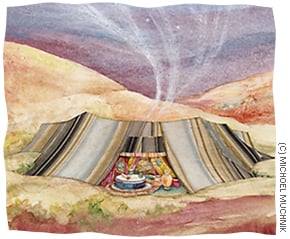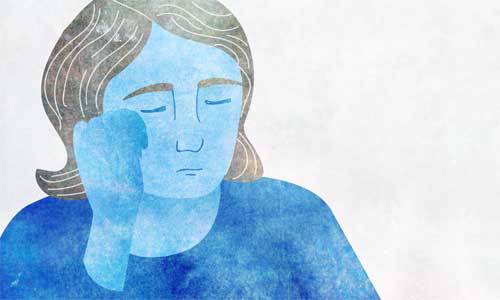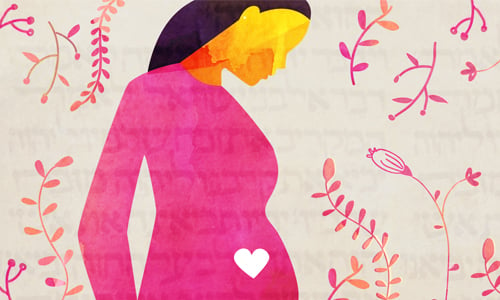Sarah was the wife of Abraham, and the first of the four matriarchs of the Jewish nation. She is widely referred to as Sarah Imeinu, “Sarah Our Mother.”
- Along with her husband, the Patriarch Abraham, Sarah was instrumental in teaching thousands of people about monotheism—the belief in one G‑d.1
- Known for her kindness and hospitality, Sarah welcomed with open arms all who visited her tent.2
- Barren for many years, through pain and turmoil, Sarah ultimately gave birth to Isaac, the second of our patriarchs, at the age of 90.3
- She was buried in Hebron, in the Cave of the Patriarchs, which her husband purchased.4
Sarah’s Early Life

Sarah was born in 1803 BCE (1958 from creation) to Haran, brother of Abraham. She married her uncle, Abraham, who was 10 years her senior. Abraham had discovered the existence of the true G‑d, and he despised the idol worship of the people around him. Abraham risked his life, showing and teaching people about the one and only G‑d.5
Abraham and Sarah spread the Abrahamic creed of monotheistic theology to all. Abraham would guide the men, while Sarah influenced the women—forming what could be seen as a proto-Chabad House!
Then, G‑d appeared to Abraham and told him to leave his land, his birthplace, and travel to a new and unknown destination.6
Abraham and Sarah, 75 and 65 years old respectively, left Haran, where their family had settled after leaving Ur Casdim, and settled in Canaan.
Sarah’s Abductions

Yet, famine soon came to the land, and they were forced to travel to Egypt. Before their arrival, Abraham hid his wife in a large box, and instructed her to say, in the event that she would be caught, that she was his sister rather than his wife. The Egyptians discovered the beautiful Sarah and gave her to Pharaoh for a wife, sparing Abraham’s life. Sarah prayed to G‑d, and Pharaoh was struck with plagues that very evening.7 Pharaoh realized his wrongdoing and sent Sarah back to Abraham. Along with gifts that he gave to Abraham, Pharaoh gave Sarah his daughter,8 the princess Hagar, to be her personal maid.
This sequence of events was repeated when Abraham and Sarah were sojourning in Gerar,9 after the destruction of Sodom (read more about Sodom here).10 Abraham introduced himself as her brother to Abimelech, the king of the Philistines,11 who promptly took her as a wife. G‑d appeared to Abimelech in a dream, threatening him with death if he failed to release Sarah. He immediately returned Sarah to her husband.
Sarah Was Barren

After Abraham and Sarah had lived in the Promised Land for 10 years and she was not blessed with a child, Sarah decided to make a supreme sacrifice and offer Hagar to Abraham as his second wife, who would bear him a child and give him a lasting legacy.12 Hagar gave birth to a son, Ishmael. But G‑d intended that Sarah become a mother as well.
Name Changes and Blessings
Sarah was born with the name Sarai, which means “my princess,” while Abraham was actually known as Abram, which means “father of Aram.” (Sarah also had another name13 —Yiskah [“Jessica”], meaning “Seer”—because she was a prophetess and had the ability to see into the future. She was also called “Seer” because people used to gaze at her beauty.)
Both names were somewhat limiting. Sarai implied that she was only “my princess,” and Abram limited Abraham’s sphere of influence to Aram, his original hometown.
In a dramatic ceremony, known as the Covenant Between the Parts, G‑d spoke to Abraham, promising him great wealth and great reward, yet Abram wasn’t satisfied. He wanted a child to carry on his legacy. G‑d promised him a child with Sarah, and changed Abram’s name to Abraham, which means “the father of all nations,”14 and Sarai to Sarah, meaning “the princess.” This change of name brought a change of fortune, which gave Sarah the spiritual capacity to give birth to a son (learn more at Name Changes in the Torah).15
Promise of Angels

Following G‑d’s command, at the age of 99, Abraham underwent circumcision. As he recovered, he prayed to G‑d to send him guests, as initially, G‑d made the day exceedingly hot so that no travelers would disturb him as he recovered. His prayers were answered, and three angels, disguised as foreign travelers, came across a weak yet welcoming Abraham. Abraham ran into the tent, telling Sarah to prepare a feast.16 While the angels were there, they promised the elderly Abraham that Sarah would have a son.17 Sarah, at the mere suggestion that she could conceive and carrying at age 89, broke out into laughter.
Birth of Isaac

A year later, after the episode of Lot and Sodom and her second kidnapping episode (see above), Sarah gave birth to Isaac,18 her one and only son, the long-awaited bearer of Abraham’s legacy. With deep joy, Abraham and Sarah hosted celebratory feasts in honor of their precious child.
To demonstrate that the boy was not a foundling, Sarah nursed the children of other women as well.19
Sarah Sends Away Hagar
After the birth of her son, Sarah saw Abraham’s other son Ishmael acting improperly. Sarah pleaded with Abraham to drive Hagar and her wayward son away, fearing that Isaac would be influenced by his older half-brother.20
G‑d told Abraham to listen to Sarah, because she was a greater prophet than he.21 Abraham acquiesced, sending his son away and giving a clear sign that Isaac would be his heir.
Sarah’s Death
When Sarah was 127 years old and her son Isaac was 37, G‑d commanded Abraham to sacrifice his beloved Isaac on the altar.22 Abraham took his son and went to Mount Moriah to bring him as a sacrifice. As he was about to slaughter the son promised to him by G‑d, an angel stopped him, pleading with him to pause. The angel explained to Abraham that G‑d had never really intended that Isaac be slaughtered, but rather was testing him, wanting Abraham to demonstrate his unwavering loyalty to G‑d. Abraham had now proved that he was indeed G‑d fearing. (For a deep explanation on this episode, click here.)
When Sarah heard that her son had almost died, it was too much for her to bear. Sarah died at the age of 127 years.23
Sarah’s Burial Place
Abraham bought the Cave of Machpelah from the Sons of Cheth (Hittites), near Hebron, where Adam and Eve had been buried, and there he laid his wife, Sarah, to rest. Abraham, along with the rest of the people, mourned Sarah’s death. Years later, Abraham was buried near his wife in the Cave of Machpelah as well. Read more about the Cave of the Patriarchs here
A Life of Goodness

In telling Sarah’s age at the time of her passing, the Torah tells us that her life was “100 years, and 20 years, and 7 years.” The Sages24 comment that this means that when she was 100, she was as pure of sin as a maiden of 20; and when she was 20, she was as beautiful as an innocent 7-year-old. Explore the depth of this teaching here.
A Chassidic Lesson from Sarah
The portion of the Torah that speaks of Sarah’s burial is known as “Chayei Sarah,” “The Life of Sarah.” Would it not be more appropriate to call it “The Death of Sarah”?
The Lubavitcher Rebbe—Rabbi Menachem Mendel Schneersohn, of blessed memory—explains that the life a tzaddik, a righteous person, is more vital after death, when the merits of her deeds are fulfilled and actualized. Sarah invested her very essence into her son, working hard to keep their home pure and holy. When we read that Isaac married Rebecca and continued in her ways, we are experiencing the true life of Sarah. Read more here.










Join the Discussion